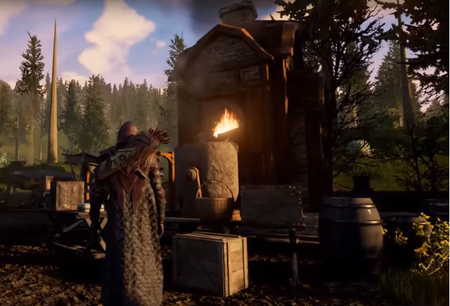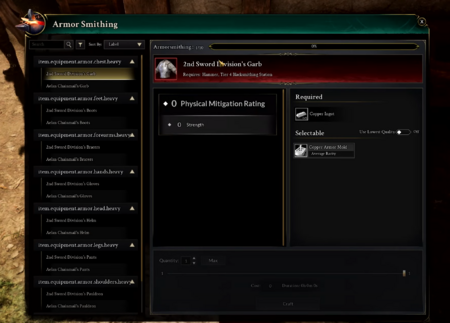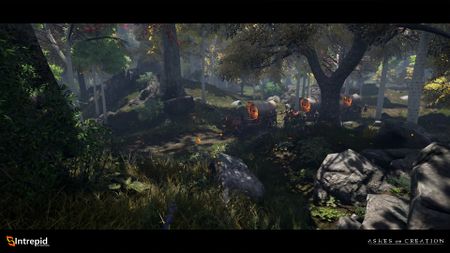Clases de artesanos
Las clases de artesano permiten al jugador especializarse en uno o más de los siguientes árboles de habilidade.[1]
Dentro de cada una de estas tres clases de artesano hay diferentes profesiones.[2]
- Los personajes de una misma cuenta (Alts) pueden tener profesiones diferentes.[3]
- Hay misiones específicas para cada profesión.[4]
- Las profesiones se equilibrarán en función de las pruebas.[5]
Un personaje sólo puede ser maestro (dominar) de una de las tres clases artesanas principales.[2]
- Es posible dominar hasta dos profesiones dentro de esta clase artesana dominada por el personaje (sujeto a pruebas).[6][5][7][3]
- Un personaje podrá alcanzar una competencia de nivel 3 o 4 en profesiones que no domine.[5]
- When it comes to balancing a system that's something that we do during testing phases. When it comes to architecting the system itself and identifying the areas in which certain certain professions excel, where they interact with ancillary systems, their interconnectivity across the artisanship system as a whole, the important part there is to identify how that the interconnectivity lives with the other professions in the artisanship system. And what type of reliance you have on particular professions to complete the path of crafting or introduction of new items into the economy.[5] – Steven Sharif
Las clases de artesano así como sus profesiones no se verán afectadas por la religión o la clase del personaje.[8][9]
- Es probable que la raza no afecte al sistema de artesanía,[8][9], sino que algunas influencias se incluyan en una opción de trasfondo que no esté intrínsecamente ligada a la raza.[8]
- One thing we've talked about in the past is replacing the racial abilities with more of a background style, where you get to select your background regardless of race; and so those two aren't tied intrinsically.[8] – Steven Sharif
- La progresión dentro de las clases de artesano no está directamente relacionada con la progresión del jugador en su clase de aventurero, pero hay requisitos que tienen en cuenta los peligros, las ubicaciones, los conjuntos de herramientas y las opciones de exploración que dependen del nivel.[10][11]
- La elección de la profesión no afecta a las estadísticas del jugador.[12]
- Crafting and gathering is a very important component of the economy that players will have direct control over. Whether you wish to build a sprawling plantation around your house, or wish to travel the vast wilderness in search of treasure and resources.[13]
- The crafting systems and artisanship in general is pretty complex.[14] – Steven Sharif
Recolección
The first major reveal is that in Ashes of Creation we have now expanded the resource gathering system to include a great many of what the world is showing you of these resources. So when you see a tree, you can chop a tree. If you see a rock, you can mine a rock.[15] – Steven Sharif
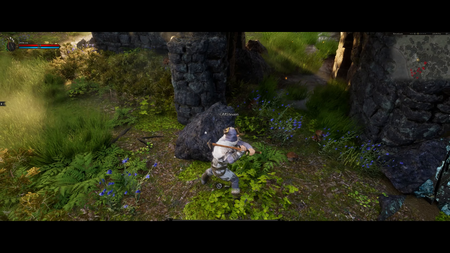
Looking at this this rock here, I don't know what that rock is before I actually complete the Harvest. But after I complete the Harvest I see that I collected basalt in the bottom right hand corner.[17] – Steven Sharif
Recolección es una de las clases artesanales en Ashes of Creation.[18][1]
- Muchos de los recursos visibles (como árboles o minerales) en el mundo abierto son recolectables.[15]
- El tipo exacto de recurso presente en un determinado nodo no se conoce hasta que el recurso es recolectado.[17]
- There's a bunch of different things in Ashes that will be gatherable. We have plants and trees and rocks and fish and animals and creatures that can be tamed; and we're thinking to reach the visual fidelity bar and to have things a little bit more rooted in what we know is that it wouldn't really make sense for you to just see gold all over the world in the same way that you would plants and trees; so we wanted to get feedback on what players think about some of the different gatherable types having different things that you would have to know and expect from them. So rocks are a good example of this, where you can see a rock but until you crack that thing open you don't know if it's full of stone, crystals, rubies, gold. So we wanted to try that out with some of our gatherables to have players have to open this thing up- and that's not to say that we players won't stumble on a nice load, or vein, or geode of gold, but most of the stuff that they would they would find to the world, unless they they look hard enough, would require them to crack that stone open.[17] – Kory Rice
- La recolección requiere la creación y el uso de herramientas.[20][21]
- La investigación desempeña un papel clave a la hora de ayudar a los recolectores a identificar recursos en lugares concretos.[22][23]
- Recolectar dentro de la zona de influencia (ZOI) de un nodo contribuirá al incremento de la experiencia.[18]
- Ciertos materiales recolectables de bajo nivel tendrán una progresión gradual hacia la artesanía (crafting) de nivel superior.[24]
- Certain low level gatherables will have a tiered progression into higher level crafting. So for example if I'm gathering... leaves of the blue petal flower to craft a pigment that's going to be used in the development of a tunic that I can wear at level one, then I may need to collect those in order to craft the pigments to craft a greater pigment that might be present in the in the crafting of a higher level item. So it's going to be a tiered progression so that materials have relevancy throughout the different levels of of crafting; and that's important from an economic stability standpoint. You need to have layered demand from a supply standpoint so that players who are interested in collecting and gathering those materials still are relevant when the later level items are crafted.[24] – Steven Sharif
Profesiones de recolección
Gathering tools
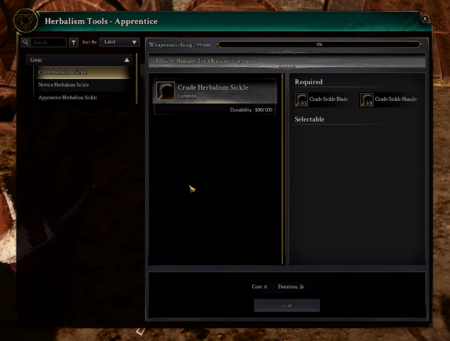
Different professions will have a number of quests available to introduce players to their first toolsets; and then, their toolset sustainability will be incumbent on the player to continue to gather the resources necessary to repeatedly create these tools, because they have a durability that gets expended when interacting with the resources in the open-world.[26] – Steven Sharif
Each gathering profession will have three tools. The tools come online as you progress through the profession; and the different resource types for each one of the professions may require different tools. So, you basically want to carry around the right tool for the job. And tools along with artisanship gear will have stats on it, so you can itemize towards how you want to gather, how fast you want to gather.[27] – Kory Rice
Las herramientas de recolección (también conocidas como herramientas de cosecha, herramientas artesanales y conjuntos de herramientas) permiten recolectar recursos en Ashes of Creation.[27][28][20][21]
- Cada profesión de recolección tiene tres herramientas de recolección. Cada herramienta permite recolectar distintos tipos de recursos.[27]
- Cada profesión tiene misiones que introducen a los jugadores en sus primeros conjuntos de herramientas.[29][26]
- Las herramientas de recolección y el equipo de artesano tienen estadísticas que afectan a las tasas de recolección y los rendimientos.[30][27][31]
- Los recolectores deben tener el certificado de artesano necesario para utilizar herramientas de ese nivel (o inferior).[32]
- Las herramientas de recolección se equipan en la ranura de herramientas de artesano de un personaje.[33]
- La progresión en la clase de artesano "recolector" desbloquea herramientas de recolección de nivel superior que permiten recolectar recursos de un nivel superior.[27][34][35]
- La progresión de artesano desbloquea herramientas de exploración de nivel superior que permiten una mejor identificación de los recursos recolectables en un lugar.[35]
- Un mayor nivel de progresión también puede acelerar los tiempos de recolección y el rendimiento de los recursos, y puede permitir el acceso a recursos en fases de crecimiento más tempranas.[30][31]
- Un recolector al máximo nivel de habilidad desbloqueará herramientas de maestro que le darán acceso a los recursos de recolección de mayor calidad.[36]
- Tools do advance within the artisan tree, so your ability to either gather, process or craft will require the equivalent tools necessary at that stage of crafting in order to accomplish the task at hand. So, you could not mine copper and mithril with the same tool.[21] – Steven Sharif
- Las herramientas tendrán durabilidad y vida útil.[26][36][37]
- Los artesanos no tendrán que depender de otros árboles para fabricar sus herramientas.[20]
- Los desarrolladores están considerando la introducción de herramientas de recolección que requieran de dos jugadores, como sierras para dos personas que puedan talar árboles más grandes.[34]
- Your progression within the profession will take account what tools you can use. There might even be some opportunity to do some gathering with other players that . Typically in other games that I play you usually do the gathering alone. You're venturing around alone; and we wanted to take a look at maybe having a friend to help you with a two person saw on a larger tree. Maybe there's some panning that you could do as opposed to just hitting with the pickaxe. So, we'll have other tools that are part of that progression path and other activities that players can do if they would like to gather together.[21] – Kory Rice
Procesado
La elaboración es una de las clases de artesano en Ashes of Creation.[38]
- Procesar o elaborar implica refinar las materias primas obtenidas de la recolección y la destrucción de objetos.[38]
- La mayor parte del tiempo empleado en el sistema de artesanía reside en la rama de procesado. El tiempo de elaboración varía en función de la calidad de los bienes procesados.[39]
- Parte del trabajo se puede llevar a cabo en los nodos, pero las mejores elaboraciones sólo se pueden realizar en las parcelas (freeholds).[40]
- Se necesitan planos para la construcción de los edificiones del freehold que se emplean para procesar los recursos en bienes procesados.[41][42][39][20][38]
- La cantidad de bienes que se pueden procesar mientras el jugador está ausente se basa en la categoría de la estación de procesado en cuestión.[39]
- El tiempo de procesado puede reducirse mejorando las capacidades y la calidad de la estación de procesado mediante un sistema de niveles de progresión.[39]
- That's going to be very important as you get to very late game processed materials that are required. Because some of these things might have days to process within a station, but if you have spent the time and done the work to advance that processing station you could cut that down considerably, perhaps even greater than 50 percent; and that's going to have a significant impact on your ability to either control markets or to create goods.[39] – Steven Sharif
- Habrá una fase de preparación para proporcionar al edificio el combustible u otros materiales necesarios para procesar el grado de materiales requerido.[42]
- Processing as it stands for Alpha-2's implementation is that there is a certain amount of prep work that's required first for the industry-specific component, which is the building. That prep work might be finding a certain amount of lumber to light the fire in kiln or whatever, to a certain temperature in order for you to process a certain grade of ore; and that grade of ore being malleable then into an ingot; and that produces that ingot so-to-speak. Now, in that process there's a gathering component, there's a preparatory phase, there is a time-related component.[42] – Steven Sharif
- También habrá elementos relacionados con el tiempo y la jugabilidad que requerirán que el jugador interactúe con el edificio de procesado. Estos elementos servirán para impulsar la entrada de materiales procesados a partir de materias primas recolectadas en la economía.[42]
- There's also possibilities that the machine you're using itself has some type of gameplay layer- should the kiln get overheated, and you have to throw some water on it or something. There are elements there in that process that we want to mimic this gameplay opportunity for players to interact; and not just be a time-sink. But time-sink is also a component of it as well, because that's the throttle for the introduction of processed materials from raw gatherables into the economy.[42] – Steven Sharif
Profesiones de procesado
Processing stations
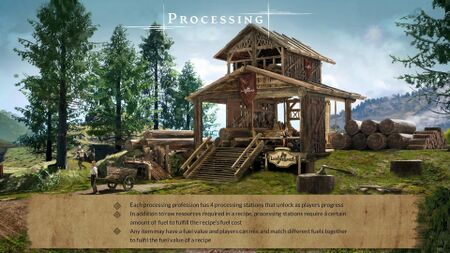
Processing stations are of course a necessary component of taking gatherables into usable crafted goods essentially to fulfill what recipes require in order to make items.[44] – Steven Sharif
We're trying to marry the visuals with what's actually going on with the station. So, if you have a job queued and you're trying to do errands throughout the node, or in your freehold or whatever, [you] should be able to look at the station and know what's going on with it: So you know he's there working and once he's done he's going to stop and you can be like, okay there's stuff ready to pick up and have some visuals associated with that. So, as much as we can have stuff rooted in world instead of throwing a bunch of UI in the player's face, that's something that we're trying to do and is important to us.[46] – Kory Rice
Processing stations are workstations that are used to process raw materials into processed goods (crafting materials) at nodes or on freeholds.[47][48][44][40][39]
- Artisan buildings are required to be placed on freehold (and node) plots to unlock placement of processing stations.[47][43][49]
- Each processing profession has four processing stations that unlock as players progress through their artisan building tech trees.[50][51][43]
- Each processing profession will have four stations; and the stations will come online as you progress through the profession. Each one of those stations will make goods that are immediately useful to the economy, to crafters, to other processors; and each processing station will build on itself and into the other stations.[52] – Kory Rice
- Master and grandmaster processing can only take place on freeholds.[43][53]
- Processing as it stands for Alpha-2's implementation is that there is a certain amount of prep work that's required first for the industry-specific component, which is the building. That prep work might be finding a certain amount of lumber to light the fire in kiln or whatever, to a certain temperature in order for you to process a certain grade of ore; and that grade of ore being malleable then into an ingot; and that produces that ingot so-to-speak. Now, in that process there's a gathering component, there's a preparatory phase, there is a time-related component.[42] – Steven Sharif
- Processing stations have queue slots that allow jobs to be queued at that station.[55] Processing jobs are processed sequentially for all players in freeholds. Processing jobs in nodes are processed sequentially per player, but concurrently with other player's jobs.[56]
- Q: Can you provide more details in regards to the design philosophy behind why it's a queue system for freeholds but not for nodes?
- A: On the freehold, processing can achieve the highest levels of processing. That's where the highest levels of processing occur. Nodes can only go up to a certain level of processing. Now we want to be able to throttle the amount of resources that can be processed at any given time in response to the fluctuation and flows of the economy. So, we want to make sure that the economy is a bigger ship when turning than being able to immediately start processing everything at once and get new resources out as the flow of supply and demand changes within the world. And because- again that's at the highest levels of processing; and you're sharing the available queues that exist at those stations. It's going to take time and it's going to take a long time for the higher level materials.[57] – Steven Sharif
- There will also be time-related and gameplay elements that require the player to interact with processing stations.[55] These elements act to throttle the introduction of processed materials from raw gatherables into the economy.[42]
- There's also possibilities that the machine you're using itself has some type of gameplay layer- should the kiln get overheated, and you have to throw some water on it or something. There are elements there in that process that we want to mimic this gameplay opportunity for players to interact; and not just be a time-sink. But time-sink is also a component of it as well, because that's the throttle for the introduction of processed materials from raw gatherables into the economy.[42] – Steven Sharif
- Processing times, yields, queue times, and job sizes can increase based on node progression, service building upgrades, node policies, and relics.[58][55][39]
- That's going to be very important as you get to very late game processed materials that are required. Because some of these things might have days to process within a station, but if you have spent the time and done the work to advance that processing station you could cut that down considerably, perhaps even greater than 50 percent; and that's going to have a significant impact on your ability to either control markets or to create goods.[39] – Steven Sharif
- Processing stations are distinct from crafting workstations that are used to craft finished goods.[53][48]
- The developers are considering a decay system for processing stations similar to item decay for gear.[59]
- Q: Do processing stations wear out over time? Do they have to be repaired?
- A: That's something that we're still discussing internally. It is coded in such a way where it's an easy variable for us to change that. There are material components that are necessary to feed the machines to keep them up and running, or it could be based on how you interact with the fuel components. If you overheat- overcharge with fuel, that can create like a system degrade similar to your armor decay, which then you have to feed materials in order to rebuild maintenance-wise. Right now it is not implemented. With that in mind, the only maintenance required is going to be through taxation. And depending on the number of permits that you have placed on the freehold will increase the amount of taxes that are necessary to be paid for the freehold.[59] – Steven Sharif
List of processing stations
- Apprentice Crushing Station
- Farms
- Fishery
- Freehold farms
- Metalworking stations
- Mills
- Novice Debarking Station
- Stables
Elaboración (Crafting)
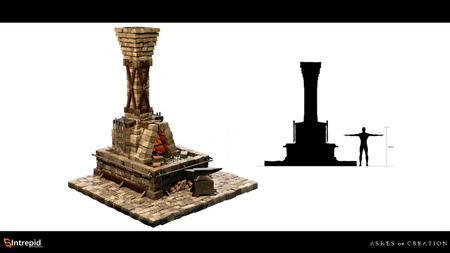
Crafting and gathering is a very important component of the economy that players will have direct control over. Whether you wish to build a sprawling plantation around your house, or wish to travel the vast wilderness in search of treasure and resources. There are many tools available to the crafters of our world. Regardless of how you gather your resources, we believe that every item that exists in the world should in some way reflect its creator. As such, there will be extreme versatility in our crafting system – giving crafters the ability to create unique items that represent their strengths and weaknesses.[13]
Elaboración (Crafting) es una de las clases de artesanía en Ashes of Creation. Es el motor de la economía del juego.[61]
- El crafteo requiere la adquisición de recetas para poder crear objetos.[20]
- Las estaciones de crafting se encuentran en las parcelas (freeholds) o en los nodos.[62][63]
- Las estaciones de crafteo de nivel superior se desbloquean con la progresión de los nodos.[64]
- El equipo de artesano permite fabricar objetos de mejor calidad.[65][66]
- El tiempo de crafteo puede variar entre profesiones, , pero la mayor parte del tiempo invertido en el sistema de artesanía recae en la rama de procesado.[39]
- Los desarrolladores buscarán feedback durante las fases de prueba para añadir una capa extra al crafting que determine el resultado en función del rendimiento del jugador.[67]
- Es poco probable que los materiales para fabricar todas las piezas de equipo puedan obtenerse únicamente farmeando mazmorras de mundo abierto .[68]
- It's unlikely that organized parties will be able to get all of the materials they need to craft every piece of equipment from farming open world dungeons alone.[68] – Cody Peterson
- Anything that you want to bring into existence in the world is going to be built by players: Whether that is Naves, Siege engines, Armas, Armadura, etc.[69] – Jeffrey Bard
En Ashes of Creation no habrá sistema laboral ni de energía.[70]
There is no labor or energy system in Ashes. However, that's not to say that crafting will not be difficult. Crafting is very difficult; but it is because it is difficult that it will be very rewarding as well.[70] – Steven Sharif
Profesiones de elaboración (crafting)
Recetas
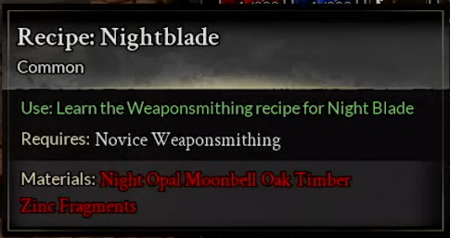
When players are looking to create different items in the game they're going to need to go out and either purchase, or get drops of recipes, or trade with other players; and when they acquire that recipe, like I have here: it says Nightblade. I can use the recipe and I will learn a Weaponsmithing recipe for the Nightblade. So, I have a recipe book that I get to keep. Essentially I learn these recipes once.[72] – Steven Sharif
Elaboración (Crafting) in Ashes of Creation is recipe (blueprint, schematic) based, not RNG based.[73][72][20][74][75]
- Recipes that are obtained must be committed to a player's recipe book (by right-clicking on the recipe item). This "consumes" the recipe item and unlocks the ability to craft the item in question.[72][76]
- Artisans must have the required artisan certification to learn recipes at that level (or lower).[77]
- Recipes can be traded or sold prior to them being committed into a player's recipe book.[76]
- In most cases learned recipes are permanently added to a character's recipe book, but in certain unique cases there will be a "charge count" where learned recipes will disappear from the recipe book after a number of uses.[72]
- Once a recipe is learned, it cannot be shared with other characters, including alts.[78]
- Recetas have slots for required and selectable crafting materials. Adding higher rarity selectable materials increases the rarity of the crafted item.[73][79][80][81][82] Choosing different selectable materials can also result in crafted items with different statblocks and unique properties.[83][84]
- These are the things we want to explore on [the] crafting side, where we introduce maybe new stat lines, or a different proportion or ratios of stats at certain tiers; and when you craft these items using better materials, the rarity of the item increases. For demonstration purposes we're using legendary, but basically when you use a higher tier than the recipe is intended for- so we could technically build this item with common copper and zinc fragments, then that would produce an uncommon item. But, since we're showcasing this at legendary tier, you can move up the tiers and have the stats increase.[81] – Mike Han
- Recipes may have an XP component, where crafting that recipe multiple times can level up the recipe and unlock better results.[79][86]
- Something unique in our crafting system [is] where we want to have recipe XP of some sort; and then those sub-recipes could [be] earned by leveling up your recipe, which means that you have to craft the Nightblade multiple times to level it up to have a better result. The sub-recipe could be from a vendor recipe or world drops like we said earlier, but the idea is one type of item can have potential to be multiple different outcomes.[86] – Mike Han
- While selectable materials offer a wide degree of customization, crafting results must lie broadly within the realms of the recipe's definition; and so cannot be arbitrarily customized.[87][85][88]
- Q: Will players have the ability to innovate within the crafting system creating unique items or designs? If so, how much customization can players expect when it comes to crafting their own gear or items?
- A: There are statically defined an array of results that can come out of a particular recipe; and your ability to unlock those results is predicated on what composition of resources you contribute to crafting that particular weapon type; and so in that sense, yes crafters will have the ability to uniquely create certain types of the recipes results, based on how they're contributing resources to it. The result has to have a corresponding recipe definition; and so in that sense it isn't completely customizable to the point where the player gets to uniquely create these particular items, but rather they are discovering what creations are possible with each recipe type.[87] – Steven Sharif
Crafting stations
There's going to be a number of different types of selectables that you can incorporate as part of the crafting process; each of them having unique results as part of the stat block for the weapon, but also increasing the quality, predicated on the quality of the selectable that you're contributing.[83] – Steven Sharif
Crafting stations (also referred to as Crafting benches) are workstations located on freeholds or within nodes.[47][48][44][62][63]
- Recetas have slots for required and selectable crafting materials. Adding higher rarity selectable materials increases the rarity of the crafted item.[80][81][82] Choosing different selectable items can also result in crafted items with different statblocks and unique properties.[83]
- Different tiers of crafting stations represent the quality of the items that can be crafted.[62]
- Higher tier crafting stations are unlocked with node progression.[64]
- Ciudad (fase 5) nodes may have one Grandmaster crafting station.[90]
- Metropolis (fase 6) nodes may have two Grandmaster crafting stations.[90]
- Players can only craft up to journeyman level on freeholds.[43]
- Upper-tier crafting benches within a node are accessible by its citizens.[91]
- Top tier crafting stations are present at all node types, however Academic nodes offer additional bonuses to crafting performed there.[92]
- Higher tier crafting stations are unlocked with node progression.[64]
- Crafting stations can pull inventory from a player's personal storage and warehouse storage from the node that the crafting station is in.[93]
- There is no limit to the number of players that can use a crafting station at the same time.[55]
- Crafting stations are distinct from processing stations, which are used to process raw materials into processed goods (crafting materials) at nodes or on freeholds.[48][44][40][39]
- Q: Can crafting stations be mobilized / moved and can they be placed anywhere in the world?
- A: It depends on the crafting station. There are going to be different tiers of crafting stations that represent the quality of item you're looking to create within that specific profession. There's going to be crafting stations that can be utilized by players within their freeholds and then crafting stations that are resigned only to the development of particular nodes, within particular areas, or particular buildings... There's a wide variety of those things to make it a more dynamic experience and something that caveat how players decide to build the world and what the value of those things are.[62] – Steven Sharif
- Legendary crafting benches are present in the Academia unique building of Metropolis (fase 6) Academic nodes.[94]
List of crafting stations
- Armor smithing stations
- Hideworks
- Laboratories
- Ship workstations
- Smithies
- Stoneworks
- Textile mills
- Weapon smithing stations
- Woodshops
Progresión de las profesiones
Dentro de cada una de las tres vías de artesanía (Recolección, procesado y Elaboración) hay diferentes profesiones. Un personaje sólo puede dominar una de estas dos vías principales y hasta dos (2) profesiones dentro de esta clase de artesanía (sujeto a pruebas).[6][5][7][3]
- When it comes to complete mastery, we're really identifying around two or three right now, but that's something that gets play tested- something gets iterated upon.[5] – Steven Sharif
- Un personaje podrá alcanzar una competencia de nivel 3 o 4 en las profesiones que no domine.[5][95] – Steven Sharif
- Players will have the opportunity to dabble in all of the professions at a very beginners level and then that gives them an understanding of what that profession feels like and then allows them to pinpoint the direction that they want to go in to master particular professions.[95] – Steven Sharif
- En función de las pruebas, se puede decidir limitar los certificados de dominio de una profesión a un valor máximo.[96][97]
- Becoming a master Crafter or a master Processor or a master Gatherer should be a significant time investment and resource investment; and because of that it should also be something that when you achieve that status it's like people on the server know who you are.[98] – Steven Sharif
- El dominio de estas profesiones no se limita a fabricar un objeto. Conceden muchas cosas como titulos, acceso a objetos, rebajas y misiones. [99]
- Previamente se decía que, con un esfuerzo considerable, un jugador podía dominar todas las profesiones dentro de una clase de artesanía. [2][100] Esto se cambió más tarde para que un jugador pudiera dominar algunas, pero no todas las profesiones dentro de esta clase de artesanía.[101][102] Esto se cambió para poder dominar hasta dos o tres profesiones dentro de una clase de artesanía que se domine (sujeto a pruebas).[5] La postura actual es poder dominar hasta dos profesiones.[6]
La progresión de artesanías dentro del árbol de habilidades, se basa en la experiencia (repetición de tareas) dentro de una rama, así como de la realización de ciertos hitos dentro de cada rama.[103]
- Elegir una de estas vías específicas dentro del árbol de habilidades, da al jugador la oportunidad de especializarse en un área determinada. Esto fomenta la inter-dependencia del jugador, mejorando la experencia en la artesanía.[104]
- When we reference not being masters of all that doesn't mean you're not a master within your own one of the three artisan types, which is crafter or gatherer, processor. You will be a master of one of those, you will not be master of the other two.[7] – Steven Sharif
Artisan mastery
A character may only ever be a Master in up to 3 professions and Grandmaster in up to 2 professions across all artisan branches.[105][106]
- Artisan mastery is no longer restricted to a single branch.[106]
- Characters may change which professions they master.[107]
- Becoming a master Crafter or a master Processor or a master Gatherer should be a significant time investment and resource investment; and because of that it should also be something that when you achieve that status it's like people on the server know who you are.[98] – Steven Sharif
- Masteries aren’t just about making an item. They grant many things, including titles, access to items, bargains, and quests. [99]
- Previously it was stated that with considerable effort a player can master all professions within a mastered parent artisan class.[2][100] This was later changed to a player being able to master some but not all professions within a mastered parent artisan class.[101][102] This was changed to being able to master up to two or three professions within a mastered parent artisan class (subject to testing).[5] This was changed to being able to master up to two professions.[6] The current stance is only being able to become a Master of 3 professions and Grandmaster of 2 professions across all branches.[105][106]
- Q: What would be the daily activities for someone at level 50 with a maxed out artisan tree?
- A: The daily activity might be something along the lines of, depending on what type of profession or processor you are, of interacting with fellow artisanship individuals to wheel and deal on supply and demand chains; orchestrating and participating and caravan roads that move materials across the world so that you can satisfy buy orders and/or commission requests. Participating in unique trades and/or dungeon experiences that have the opportunity to acquire unique crafting materials so that you can create the dragon's legendary sword and sell that potentially. Finding unique harvestable materials in remote parts of the world or engaging in treasure map finding for again unique materials and/or processing things. There's a whole host of different intents that are loops for the players to participate in that again are situationally relevant based on the world state.[108] – Steven Sharif
Artisan gear
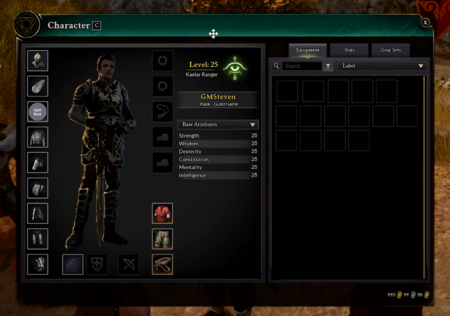
There's gear for all of the different crafting, gathering, and processing professions that'll help you do those different trades.[110] – Kory Rice
Artisan gear boosts artisans in their gathering, processing, or crafting professions.[110][65][66]
- Profession NPCs sell lower level artisan gear.[111] Higher level gear is crafted by players.[65]
- There are three artisan gear slots on a character's paper doll UI.[109] Previously these was referred to as undergarment slots.[65]
- Artisan gear and adventuring gear do not need to be swapped for either to be effective when they are equipped on a character, but players will be able to toggle gear visibility between their adventuring and artisan gear.[112][109][65]
- If you want to be seen as wearing the herbalists outfit, you're still going to have your adventuring gear present and on the character, and benefiting from the stats that are conferred by them; and vice-versa.[112] – Steven Sharif
- Gathering tools and artisan gear have stats that affect gathering rates and yields.[27][31]
- Gear for artisans are going to live alongside your adventuring gear. So you will currently- the approaches, and we'll test this but currently- the approach is you'll have artisanship oriented gear. This might be beneficial for your gathering; it might be beneficial for your processing, or crafting, or whatever it is- your profession. Essentially you will craft that gear, you will equip that gear, it'll live almost as a undergarment slot so to speak; and then you can activate that and it will show the appearance if you wish during the activation when you gain the benefit from the from the gear itself; and then could disappear afterwards and go back to your adventuring gear. That's the current approach. We're going to play with that a little bit. There's some discussion and disagreement on the team about how we do that, but our hopes are for Alpha two, we will have I think a couple of sets at least. We're demonstrating all of the artisanship from gathering to processing to crafting in limited fashion in Alpha 2 want to have that gear present to play with this approach.[65] – Steven Sharif
Work orders
A work order system is planned that will help players find artisans in nodes.[113]
Cadena de suministros artesanales
Los artesanos dentro Ashes of Creation deben elegir una rama en su arbol de habilidades artesanalas. Esta dependencia entre ramas establece una cadena de suministros desde las materias primas hasta el producto finalizado.[114][115] Cada etapa de la cadena puede requerir el uso de caravanas para transportar mercancias de un artesano a otro.[104]
- Obtención de las materias primas:[116]
- Usando la profesión de recolección.[116]
- Matando mobs y jefes.[117][116]
- Desmontando armas o armaduras.[116]
- Comprandolos a otros jugadores.[116]
- Refinando las materias primas con la profesión de procesamiento.[115]
- La profesión de elaboración termina el producto usando las recetas de elaboración.[115]
As a crafter you're going to want to know where certain recipes can be fulfilled; which nodes have the capability of creating what you've processed material that you've gathered for; and then you're going to want to plan out your route to either transit the goods there or make sure that you're situated in the area so that you can go out collect and build in that area as well. So there's a lot of planning that's going to be necessary.[119] – Steven Sharif
Timeline
Las clases de artesanía (Recolección, Procesado, Elaboración (Crafting)) estarán disponible en su totalidad durante el Alpha-2 y las Betas.[120][121]
- Durante la Alpha-1 estaba disponible aproximadamente un diez porciento del sistema de artesanía.[122][120][121]
- Crafting honestly will not come online in any sense of its true form until Alpha-2. Alpha-1 has essentially what are intended to be the core gameplay loop of crafting, meaning the collection of materials, the translation of those materials into processed goods, and the use of those processed goods into item acquisition. That's the core gameplay loop that is currently present in Alpha-1. But those are mostly facilitated piggy backing the merchant systems right now and not actually using the real crafting system; and that's because crafting hasn't been completed in a form that can be implemented in Alpha-1, but will be for Alpha-2. What's present in Alpha-1 doesn't even really scratch the surface for crafting[121] – Steven Sharif
Visuales
Ver además
Guías de la comunidad
Referencias
- ↑ 1.0 1.1

- ↑ 2.0 2.1 2.2 2.3

- ↑ 3.0 3.1 3.2 Transmisión en vivo, 2017-05-24 (32:07).
- ↑ Pódcast, 2021-04-11 (44:29).
- ↑ 5.0 5.1 5.2 5.3 5.4 5.5 5.6 5.7 5.8 Transmisión en vivo, 2022-04-29 (1:13:00).
- ↑ 6.0 6.1 6.2 6.3

- ↑ 7.0 7.1 7.2 Transmisión en vivo, 2019-07-26 (1:09:46).
- ↑ 8.0 8.1 8.2 8.3 Transmisión en vivo, 2023-02-24 (1:18:05).
- ↑ 9.0 9.1 Transmisión en vivo, 2020-08-28 (2:05:21).
- ↑ Transmisión en vivo, 2022-10-28 (1:32:38).
- ↑ Transmisión en vivo, 2020-07-31 (1:31:11).
- ↑ Transmisión en vivo, 2017-07-18 (37:25).
- ↑ 13.0 13.1 About Ashes of Creation.
- ↑

- ↑ 15.0 15.1 15.2 15.3 Vídeo, 2022-10-28 (0:47).
- ↑ Vídeo, 2022-10-28 (12:31).
- ↑ 17.0 17.1 17.2 Vídeo, 2022-10-28 (9:19).
- ↑ 18.0 18.1 18.2 Transmisión en vivo, 2017-09-03 (10:48).
- ↑ Transmisión en vivo, 2021-07-30 (1:11:58).
- ↑ 20.0 20.1 20.2 20.3 20.4 20.5 Entrevista, 2020-03-27 (9:00).
- ↑ 21.0 21.1 21.2 21.3 Entrevista, 2018-05-11 (38:25).
- ↑ Vídeo, 2022-10-28 (10:52).
- ↑ Transmisión en vivo, 2022-04-29 (25:16).
- ↑ 24.0 24.1 Pódcast, 2018-05-11 (1:00:07).
- ↑ Vídeo, 2023-11-30 (7:56).
- ↑ 26.0 26.1 26.2 26.3 Vídeo, 2023-11-30 (5:58).
- ↑ 27.0 27.1 27.2 27.3 27.4 27.5 27.6 Vídeo, 2023-06-30 (3:14).
- ↑ Transmisión en vivo, 2022-10-14 (32:38).
- ↑ Vídeo, 2023-11-30 (16:40).
- ↑ 30.0 30.1 Transmisión en vivo, 2023-12-19 (1:53:02).
- ↑ 31.0 31.1 31.2 Vídeo, 2022-10-28 (26:14).
- ↑ Pódcast, 2023-12-03 (12:27).
- ↑ Vídeo, 2023-11-30 (9:36).
- ↑ 34.0 34.1 Vídeo, 2022-10-28 (25:11).
- ↑ 35.0 35.1 Transmisión en vivo, 2020-04-30 (53:11).
- ↑ 36.0 36.1 36.2 Transmisión en vivo, 2020-07-31 (1:05:58).
- ↑ 37.0 37.1

- ↑ 38.0 38.1 38.2 38.3 Transmisión en vivo, 2017-05-05 (34:15).
- ↑ 39.0 39.1 39.2 39.3 39.4 39.5 39.6 39.7 39.8 39.9 Pódcast, 2021-04-11 (40:20).
- ↑ 40.0 40.1 40.2 Transmisión en vivo, 2022-06-30 (1:08:02).
- ↑ Transmisión en vivo, 2022-06-30 (1:09:29).
- ↑ 42.0 42.1 42.2 42.3 42.4 42.5 42.6 42.7 42.8 Transmisión en vivo, 2022-02-25 (1:12:27).
- ↑ 43.0 43.1 43.2 43.3 43.4 43.5 43.6 Development Update with Freehold Preview.
- ↑ 44.0 44.1 44.2 44.3 Transmisión en vivo, 2023-04-07 (31:49).
- ↑ Vídeo, 2023-11-30 (46:59).
- ↑ 46.0 46.1 Vídeo, 2023-11-30 (48:22).
- ↑ 47.0 47.1 47.2 Blog: Exploring the Boundless Opportunities of Freeholds.
- ↑ 48.0 48.1 48.2 48.3

- ↑ Vídeo, 2023-06-30 (15:34).
- ↑ Entrevista, 2023-07-09 (33:55).
- ↑ Transmisión en vivo, 2023-06-30 (33:26).
- ↑ Transmisión en vivo, 2023-06-30 (37:30).
- ↑ 53.0 53.1 53.2 Vídeo, 2023-06-30 (16:02).
- ↑ 54.0 54.1 Transmisión en vivo, 2023-06-30 (38:18).
- ↑ 55.0 55.1 55.2 55.3 Transmisión en vivo, 2023-11-30 (1:26:16).
- ↑ Vídeo, 2023-11-30 (39:15).
- ↑ Transmisión en vivo, 2023-11-30 (1:28:10).
- ↑ Vídeo, 2023-11-30 (43:43).
- ↑ 59.0 59.1 Entrevista, 2023-07-09 (54:46).
- ↑ Transmisión en vivo, 2018-08-17 (15:14).
- ↑
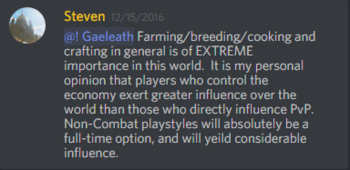
- ↑ 62.0 62.1 62.2 62.3 Transmisión en vivo, 2020-01-30 (1:38:26).
- ↑ 63.0 63.1 Transmisión en vivo, 2017-05-12 (1:00:18).
- ↑ 64.0 64.1 Entrevista, 2020-07-19 (6:38).
- ↑ 65.0 65.1 65.2 65.3 65.4 65.5 65.6 Transmisión en vivo, 2022-06-30 (1:17:34).
- ↑ 66.0 66.1 Transmisión en vivo, 2021-03-26 (1:06:50).
- ↑ Transmisión en vivo, 2022-10-14 (35:22).
- ↑ 68.0 68.1 Forums - Livestream Q&A 2022-08-26.
- ↑ Transmisión en vivo, 2017-05-24 (17:08).
- ↑ 70.0 70.1 Entrevista, 2018-10-20 (2:31:39).
- ↑ Vídeo, 2023-11-30 (3:15).
- ↑ 72.0 72.1 72.2 72.3 Vídeo, 2023-11-30 (3:49).
- ↑ 73.0 73.1 Transmisión en vivo, 2023-11-30 (1:58:55).
- ↑ Transmisión en vivo, 2017-05-05 (20:41).
- ↑

- ↑ 76.0 76.1 Entrevista, 2021-02-07 (37:26).
- ↑ Pódcast, 2023-12-03 (17:10).
- ↑ Transmisión en vivo, 2023-11-30 (1:57:38).
- ↑ 79.0 79.1 Transmisión en vivo, 2023-11-30 (1:54:37).
- ↑ 80.0 80.1 Transmisión en vivo, 2023-11-30 (1:38:47).
- ↑ 81.0 81.1 81.2 81.3 Vídeo, 2023-11-30 (59:21).
- ↑ 82.0 82.1 Entrevista, 2018-10-20 (17:31).
- ↑ 83.0 83.1 83.2 Vídeo, 2023-11-30 (1:01:04).
- ↑ Transmisión en vivo, 2017-05-26 (5:25).
- ↑ 85.0 85.1 Transmisión en vivo, 2022-01-28 (1:19:48).
- ↑ 86.0 86.1 Vídeo, 2023-11-30 (1:02:15).
- ↑ 87.0 87.1 Transmisión en vivo, 2023-11-30 (1:56:01).
- ↑ Entrevista, 2021-02-07 (38:15).
- ↑ Vídeo, 2023-08-31 (45:06).
- ↑ 90.0 90.1 Transmisión en vivo, 2023-12-19 (1:49:28).
- ↑ Pódcast, 2021-09-29 (4:43).
- ↑ Transmisión en vivo, 2023-12-19 (1:50:51).
- ↑ Transmisión en vivo, 2022-07-29 (1:17:33).
- ↑ Blog: Know Your Nodes - Scientific Node Type
- ↑ 95.0 95.1 Entrevista, 2020-03-27 (5:25).
- ↑
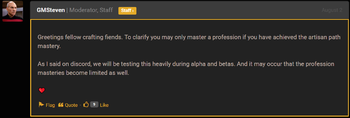
- ↑

- ↑ 98.0 98.1 Entrevista, 2020-07-20 (18:47).
- ↑ 99.0 99.1

- ↑ 100.0 100.1
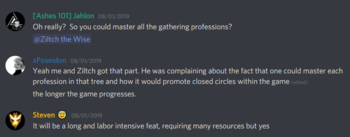
- ↑ 101.0 101.1

- ↑ 102.0 102.1

- ↑ Entrevista, 2021-02-07 (36:38).
- ↑ 104.0 104.1 Transmisión en vivo, 2017-05-10 (6:12).
- ↑ 105.0 105.1

- ↑ 106.0 106.1 106.2
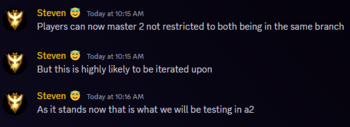
- ↑

- ↑ Entrevista, 2023-07-09 (42:51).
- ↑ 109.0 109.1 109.2 Vídeo, 2023-11-30 (19:06).
- ↑ 110.0 110.1 Vídeo, 2023-11-30 (5:47).
- ↑ Vídeo, 2023-11-30 (12:05).
- ↑ 112.0 112.1 Transmisión en vivo, 2023-11-30 (1:37:49).
- ↑ Pódcast, 2023-12-03 (16:06).
- ↑ Entrevista, 2020-07-20 (20:17).
- ↑ 115.0 115.1 115.2 115.3 Transmisión en vivo, 2017-05-10 (8:22).
- ↑ 116.0 116.1 116.2 116.3 116.4 Transmisión en vivo, 2017-05-08 (20:41).
- ↑ Transmisión en vivo, 2017-07-18 (38:30).
- ↑ Transmisión en vivo, 2017-05-26 (26:00).
- ↑ Entrevista, 2018-05-11 (24:18).
- ↑ 120.0 120.1 Transmisión en vivo, 2021-03-26 (42:28).
- ↑ 121.0 121.1 121.2 Entrevista, 2021-02-07 (35:30).
- ↑ Transmisión en vivo, 2021-04-30 (41:18).
